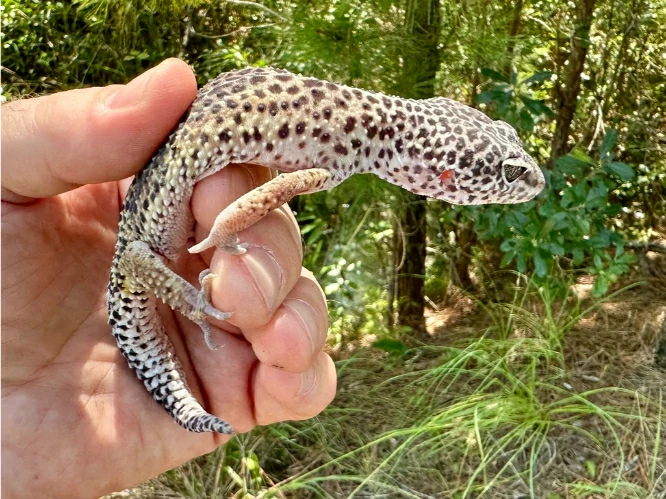If you’ve ever looked into a terrarium and seen a gecko sticking to the glass while a frog just sits on a leaf below, you might wonder, can these two actually live together?
They both look calm, quiet, and curious. But what really happens when geckos and frogs share the same space?
Geckos and frogs don’t naturally get along, but sometimes they can tolerate each other if the conditions are right. They come from very different worlds, with different environmental needs, instincts, and ways of living. Sometimes they get along. Other times, stress or competition makes it tough.
Geckos and Frogs Are Really Different
Even though they both like warm, moist places, geckos and frogs grew up in very different ways. Frogs are amphibians, and geckos are reptiles.

That might sound small, but it changes almost everything about how they live. Frogs breathe through both lungs and their skin.
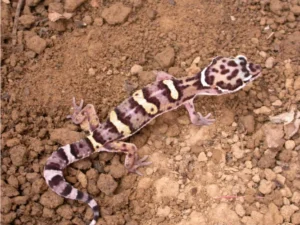
Geckos only breathe with lungs. Frogs need constant moisture, while geckos prefer dry surfaces and hiding spots.
You can see the difference in how they move. Frogs hop or crawl near water. Geckos climb walls, branches, and even ceilings.
Basically, they live in different layers of the same area.
What Happens When They Cross Paths in the Wild?
Out in nature, geckos and frogs sometimes share the same area, like a forest, a garden wall, or a rock near a stream.
Still, they usually avoid each other. Not because they don’t like each other, but because they don’t need to interact.
Geckos hunt insects, mostly at night. Frogs hunt too, but they usually wait for prey to come close.
So while a frog is sitting under a leaf, a gecko might be running along the wall above it.
Their paths cross, but rarely cause trouble. Only when space is tight (like a corner of a garden or under a shared shelter) might they bump into each other. Usually, one just moves away.
But things change when they’re forced together in a tank.
Can You Keep Geckos and Frogs Together?
This is one of the most common questions among people who keep reptiles and amphibians.
It’s easy to see why, both animals are small, quiet, and interesting to watch. A shared tank looks like a perfect mini jungle.
Here’s the thing: their needs are very different.
-
Frogs need high humidity and water to stand in.
-
Many geckos, like leopard geckos, need dry, warm spots with lower humidity.
-
Frogs can carry skin bacteria that might make geckos sick.
-
Geckos can sometimes stress out frogs or even bite them.
Mixing them usually causes stress. One or both might stop eating, hide all the time, or get sick.
In rare cases, tiny, calm species in a very big tank might get along, but you’d have to watch them closely every day.
What Kind of Habitat Could Support Both?
If someone really wants to keep both together, the setup has to meet very specific needs.
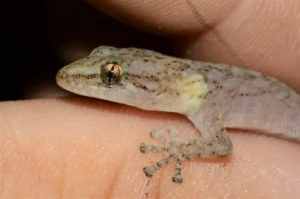
A bioactive vivarium with lots of hiding spots, vertical and horizontal spaces, and separate areas of temperature and humidity could sometimes work, but only for small, calm species.
For example:
-
A small day gecko with a tree frog might tolerate each other if the enclosure feels like a humid tropical canopy.
-
There must be high branches and dry spots for the gecko, and lower, damp zones with water pools for the frog.
Even then, it’s not simple. You’d need to watch behavior closely every day.
If either animal shows stress (like refusing food, hiding all the time, or changing color) they should be separated immediately.
Why Geckos Sometimes Don’t Like Frogs Nearby
You might think geckos, being good climbers, wouldn’t mind a quiet frog nearby. But geckos quietly protect their space.
Even small geckos defend their hiding spots and hunting areas. When another animal (even a frog) comes near, it can make the gecko uneasy.
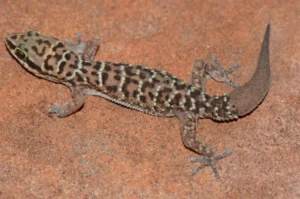
Geckos might flick their tails, make chirping sounds, or change to darker colors. These are signs they feel threatened or defensive.
Frogs don’t really understand these signals. They just stay still, which can make the gecko even more unsure.
So while they don’t fight most of the time, tension can quietly build.
What About Size Differences?
Size matters a lot.
If a frog is much bigger, it might try to eat a small gecko, yes, really. Some frogs, like African bullfrogs, have wide mouths and quick reflexes. Anything that moves near them looks like food.
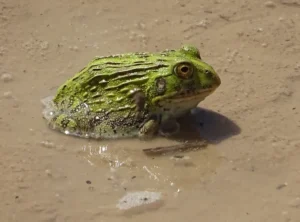
On the other hand, a big gecko might bite a smaller frog out of curiosity or to defend its space.
Even if neither attacks, just the threat of being eaten or bitten can cause constant stress. That stress often leads to sickness or early death in captivity.
So if you see advice online about mixing them, always check the species and size carefully.
Do Any Geckos and Frogs Actually Tolerate Each Other?
There are a few special cases.
In tropical areas, people have seen small tree frogs and house geckos resting on the same wall at night, both waiting for insects attracted by a porch light.
They aren’t friends, but they’re not enemies either. It’s more like peaceful coexistence. Each hunts in its own way, ignoring the other.
This happens because there’s enough space, food, and hiding spots for both. Neither feels threatened.
That’s about as close as they get to “getting along.”
Why Geckos and Frogs Use Sound Differently
Here’s another difference: how they communicate.
Frogs call loudly to attract mates or mark territory. Their croaks and trills carry through the night air.
Geckos chirp or click softly, usually to show mild aggression or find mates.
When you put both near each other, the frog’s louder calls can stress out the gecko. The constant noise can make it hide more or stop hunting at night.
That’s another reason they rarely do well in shared spaces.
Do Geckos Ever Hunt Frogs?
Usually, no, but there are exceptions.
Larger geckos, like Tokay geckos, are strong enough to hunt small animals, including baby frogs. Tokays are known for strong jaws and defending their space.
In the wild, they mostly eat insects, but if a frog moves and fits in their mouth, they might try to catch it.
This doesn’t make them mean, just opportunistic hunters. That’s another reason mixing species in captivity can go wrong.
Do Frogs Ever Hurt Geckos?
Frogs aren’t aggressive, but they can cause problems by accident.
Their skin makes mild toxins to protect them from predators. These substances might irritate a gecko’s skin or mouth if contact happens a lot.
Sometimes these secretions get into shared water or damp surfaces, affecting the gecko’s health over time.
Also, many frogs need higher humidity than geckos can handle. Constant moisture can cause skin or breathing problems for geckos that like drier air.
Even without fighting, living together can slowly wear one down.
What Do Experts Recommend?
Most reptile and amphibian experts say:
-
Keep geckos and frogs in separate tanks.
It’s not about dislike, it’s about giving each animal the best chance to live comfortably and safely.
A shared tank might look cool for a while, but it rarely keeps them healthy long-term.
Instead, you can keep two separate tanks side by side. That way, you can watch both animals (their movements, feeding styles, and nighttime routines) without putting them at risk.
It’s like having two windows into the same rainforest, without any stress.
Conclusion
So, do geckos and frogs get along?
Not really, at least not like we imagine. They don’t fight much, but they don’t form bonds either. Each lives in its own way, which doesn’t mix easily with the other’s.
In nature, they coexist by keeping their distance. In captivity, that same distance keeps them safe.
Hi, my name is Ezra Mushala, i have been interested animals all my life. I am the main author and editor here at snakeinformer.com.

